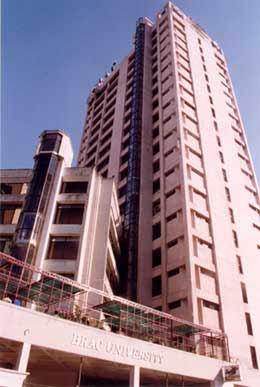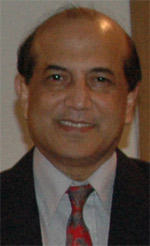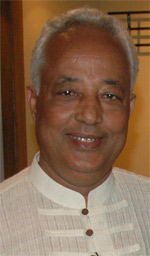SWEDISH SOUTH ASIAN STUDIES NETWORK
Meeting with representatives of BRAC University’s James P. Grant School of Public Health, Sunday 4 December 2005
BRAC web page: www.brac.net
BRAC University web page: www.bracuniversity.ac.bd
 BRAC
– Bangladesh Rural Advancement Committee – is probably the
biggest Development NGO in the country and maybe one of the biggest in
the world. With its nationwide activities in education, health and rural
development it is almost like a “state in the state”, which
its skyscraper head office in the Gulshan area of Dhaka makes clear. Its
success in attracting funds from governments and other donors all over
the world makes it one the most powerful institutions in Bangladeshi society
today. Today BRAC not only works in Bangladesh, but also operates in neighboring
countries like Afghanistan to ensure a just, enlightened, healthy and
democratic society.
BRAC
– Bangladesh Rural Advancement Committee – is probably the
biggest Development NGO in the country and maybe one of the biggest in
the world. With its nationwide activities in education, health and rural
development it is almost like a “state in the state”, which
its skyscraper head office in the Gulshan area of Dhaka makes clear. Its
success in attracting funds from governments and other donors all over
the world makes it one the most powerful institutions in Bangladeshi society
today. Today BRAC not only works in Bangladesh, but also operates in neighboring
countries like Afghanistan to ensure a just, enlightened, healthy and
democratic society.
Among its many activities BRAC also runs a private university, BRAC University,
established in 2001 with the goal of providing high quality broad-based
education for students – the next generation of young leaders –
and equipping them with the skills and knowledge necessary for taking
on the challenges of development. BRAC University now runs comprehensive
programmes in Microfinance, Health, Education, and Social Development.
In 2004, BRAC furthermore launched the James
P. Grant School of Public Health (named in honour of James Grant who
was a UNICEF representative committed to working in Bangladesh for the
poor) to provide public health education of international excellence relevant
to the particular needs of the developing world. The school was set up
and is jointly run by the International Centre for Diarrhoeal Disease
Research, Bangladesh, ICDDR,B (see our report
from ICDDR,B).
The mission of the School, also known as BRAC School of Public Health,
is to improve health outcomes of populations in disadvantaged areas of
the world, particularly the poor and women, through the application of
the art and science of public health. The school is an example of BRAC’s
continued effort to contribute towards Human Development worldwide.
The School’s first major undertaking is a Master of Public Health
(MPH) programme, which opened its doors to Bangladeshi and international
students in February 2005. The MPH programme is an intensive 12-month
programme. The School has received generous grants from the Rockefeller
Foundation, The James P. Grant Trust, UNICEF, UN/Afghanistan and BRAC
to finance the first year of the programme. The 1 million-dollar grant
that BRAC received from the Gates Foundation in 2004 is being used to
initiate an endowment fund for the School.
The Masters programme in Public Health also has strong Swedish connections,
as it is run in collaboration with Karolinska Institutet Medical University
in Stockholm, Uppsala University and Umeå University.
 We
had been invited for dinner at BRAC Centre Inn, by Professor A.
Mushtaque R. Chowdhury, Dean of James P. Grant School of Public Health
(photo to the right). He is also Bangladeshi team leader of the
PHILL project (Primary Health-Care in Later Life: improving services in
Bangladesh and Vietnam) run by a Swedish-British-Bangladeshi-Vietnamese
research consortium, funded by the European Commission. The Swedish partner
consists of the Division of Geriatric Epidemiology,
Department of NEUROTEC (Clinical Neuroscience, Occupational Therapy
and Elderly Care Research); Karolinska Institutet, contact person Dr Zarina
Kabir. In Bangladesh this research is carried out at the Research
and Evaluation Division of BRAC, ICDDR,B, and the Centre for Health and
Population Research. An International Conference on ”Mainstreaming
Ageing in Health Systems and Rural Development” was held in
Dhaka in November 2005, just before our arrival in the country. More
information on the conference.
We
had been invited for dinner at BRAC Centre Inn, by Professor A.
Mushtaque R. Chowdhury, Dean of James P. Grant School of Public Health
(photo to the right). He is also Bangladeshi team leader of the
PHILL project (Primary Health-Care in Later Life: improving services in
Bangladesh and Vietnam) run by a Swedish-British-Bangladeshi-Vietnamese
research consortium, funded by the European Commission. The Swedish partner
consists of the Division of Geriatric Epidemiology,
Department of NEUROTEC (Clinical Neuroscience, Occupational Therapy
and Elderly Care Research); Karolinska Institutet, contact person Dr Zarina
Kabir. In Bangladesh this research is carried out at the Research
and Evaluation Division of BRAC, ICDDR,B, and the Centre for Health and
Population Research. An International Conference on ”Mainstreaming
Ageing in Health Systems and Rural Development” was held in
Dhaka in November 2005, just before our arrival in the country. More
information on the conference.
 We
had a nice conversation about BRAC University, its international collaborations,
and the Masters programme. Prof. Demissie
Habte (photo to the left), hailing from Ethiopia with many
years of work in Dhaka (for several years he was the Executive Director
of ICDDR,B) was also with us for the dinner in the neat BRAC Inn restaurant.
We
had a nice conversation about BRAC University, its international collaborations,
and the Masters programme. Prof. Demissie
Habte (photo to the left), hailing from Ethiopia with many
years of work in Dhaka (for several years he was the Executive Director
of ICDDR,B) was also with us for the dinner in the neat BRAC Inn restaurant.
The Masters Programme in Public Health is a very advanced programme running
for 12 months and ‘uses a multi-disciplinary problem-based learning
approach primary areas being: Epidemiology, Biostatistics, Social and
Behavioural Sciences, Health Systems Management, Health Economics and
financing, and Environmental Health.’ It has 25 students and there
were about 400 applicants to each programme. When we asked if there are
jobs waiting for the students, the answer was that there are none at the
moment, but that they anticipate that there will be soon when the government
and other agencies realise the need for an integrated approach to health
problems.
The course is based on the collaboration of several international partners.
Besides the Swedish universities mentioned above, also Columbia University,
Harvard School of Public Health, London School of Hygiene and Tropical
Medicine, and University of Amsterdam are participating in the programme.
In addition, teachers are flown in from these and other institutions worldwide.
In December 2005 a group of 15 students from Uppsala University participated
in a two weeks course on ‘Mother and Child Nutrition’ at James
P. Grant School of Public Health, a course which includes both lectures
and field visits.
SASNET - Swedish South Asian Studies Network/Lund
University
Address: Scheelevägen 15 D, SE-223 70 Lund, Sweden
Phone: +46 46 222 73 40
Webmaster: Lars Eklund
Last updated
2008-11-05
SASNET - Swedish South Asian Studies Network/Lund
University
Address: Scheelevägen 15 D, SE-223 70 Lund, Sweden
Phone: +46 46 222 73 40
Webmaster: Lars Eklund
Last updated
2008-11-05
